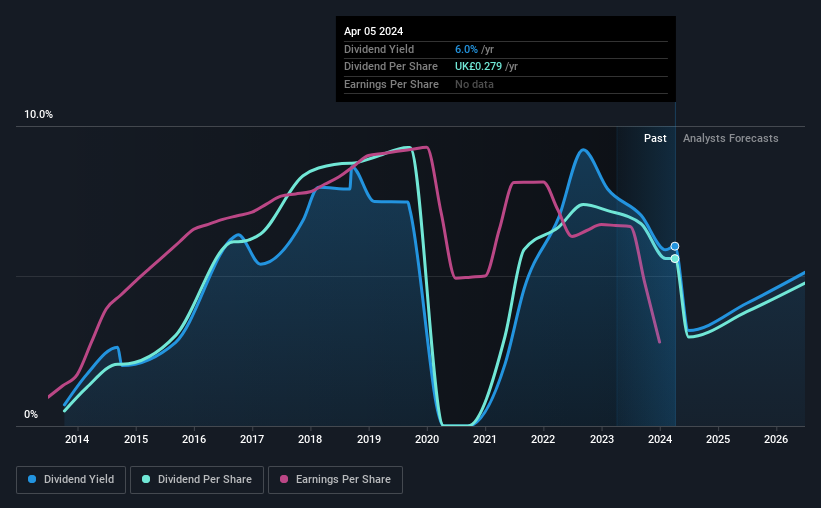We Wouldn't Be Too Quick To Buy Barratt Developments plc (LON:BDEV) Before It Goes Ex-Dividend
Readers hoping to buy Barratt Developments plc (LON:BDEV) for its dividend will need to make their move shortly, as the stock is about to trade ex-dividend. The ex-dividend date is one business day before the record date, which is the cut-off date for shareholders to be present on the company's books to be eligible for a dividend payment. The ex-dividend date is important because any transaction on a stock needs to have been settled before the record date in order to be eligible for a dividend. Therefore, if you purchase Barratt Developments' shares on or after the 11th of April, you won't be eligible to receive the dividend, when it is paid on the 17th of May.
The company's next dividend payment will be UK£0.044 per share, on the back of last year when the company paid a total of UK£0.28 to shareholders. Based on the last year's worth of payments, Barratt Developments has a trailing yield of 6.0% on the current stock price of UK£4.655. Dividends are an important source of income to many shareholders, but the health of the business is crucial to maintaining those dividends. So we need to investigate whether Barratt Developments can afford its dividend, and if the dividend could grow.
View our latest analysis for Barratt Developments
If a company pays out more in dividends than it earned, then the dividend might become unsustainable - hardly an ideal situation. Barratt Developments distributed an unsustainably high 125% of its profit as dividends to shareholders last year. Without extenuating circumstances, we'd consider the dividend at risk of a cut. A useful secondary check can be to evaluate whether Barratt Developments generated enough free cash flow to afford its dividend. Barratt Developments paid out more free cash flow than it generated - 183%, to be precise - last year, which we think is concerningly high. It's hard to consistently pay out more cash than you generate without either borrowing or using company cash, so we'd wonder how the company justifies this payout level.
Barratt Developments does have a large net cash position on the balance sheet, which could fund large dividends for a time, if the company so chose. Still, smart investors know that it is better to assess dividends relative to the cash and profit generated by the business. Paying dividends out of cash on the balance sheet is not long-term sustainable.
Cash is slightly more important than profit from a dividend perspective, but given Barratt Developments's payouts were not well covered by either earnings or cash flow, we would be concerned about the sustainability of this dividend.
Click here to see the company's payout ratio, plus analyst estimates of its future dividends.
Have Earnings And Dividends Been Growing?
Companies with falling earnings are riskier for dividend shareholders. Investors love dividends, so if earnings fall and the dividend is reduced, expect a stock to be sold off heavily at the same time. Readers will understand then, why we're concerned to see Barratt Developments's earnings per share have dropped 19% a year over the past five years. When earnings per share fall, the maximum amount of dividends that can be paid also falls.
The main way most investors will assess a company's dividend prospects is by checking the historical rate of dividend growth. Barratt Developments has delivered an average of 27% per year annual increase in its dividend, based on the past 10 years of dividend payments. The only way to pay higher dividends when earnings are shrinking is either to pay out a larger percentage of profits, spend cash from the balance sheet, or borrow the money. Barratt Developments is already paying out 125% of its profits, and with shrinking earnings we think it's unlikely that this dividend will grow quickly in the future.
To Sum It Up
From a dividend perspective, should investors buy or avoid Barratt Developments? Not only are earnings per share declining, but Barratt Developments is paying out an uncomfortably high percentage of both its earnings and cashflow to shareholders as dividends. This is a clearly suboptimal combination that usually suggests the dividend is at risk of being cut. If not now, then perhaps in the future. It's not the most attractive proposition from a dividend perspective, and we'd probably give this one a miss for now.
Although, if you're still interested in Barratt Developments and want to know more, you'll find it very useful to know what risks this stock faces. Every company has risks, and we've spotted 3 warning signs for Barratt Developments (of which 1 makes us a bit uncomfortable!) you should know about.
A common investing mistake is buying the first interesting stock you see. Here you can find a full list of high-yield dividend stocks.
Have feedback on this article? Concerned about the content? Get in touch with us directly. Alternatively, email editorial-team (at) simplywallst.com.
This article by Simply Wall St is general in nature. We provide commentary based on historical data and analyst forecasts only using an unbiased methodology and our articles are not intended to be financial advice. It does not constitute a recommendation to buy or sell any stock, and does not take account of your objectives, or your financial situation. We aim to bring you long-term focused analysis driven by fundamental data. Note that our analysis may not factor in the latest price-sensitive company announcements or qualitative material. Simply Wall St has no position in any stocks mentioned.

 Yahoo Finance
Yahoo Finance 
